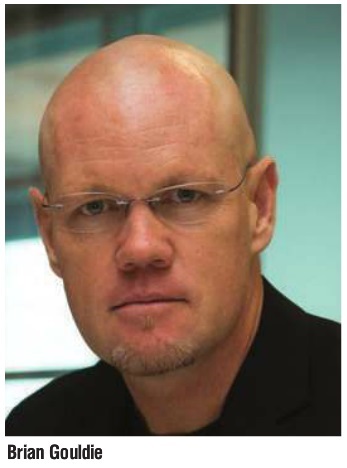Telecom giant to roll out optic cable countrywide, to build state-of-the-art headquarters in Kampala
On March 04, MTN CEO Brian Gouldie told journalists at a press briefing that the company was going to invest Shs 238 billion in its network in Uganda in 2016. On May 26 – exactly three months later – Gouldie sat with executives from four top banks in Uganda at another press briefing to announce that they had secured a loan of $114 million (about Shs 380 billion.
The cash is to be used to implement projects involving the expansion of its 3G, 4G networks as well as its fibre optic cable network. It’s a big statement of intent in a market characterized with stiff competition but low investment.
The funding, secured from four local commercial banks – Stanbic Bank, Citi Bank, Standard Chartered Bank and Barclays Bank – as a syndicated loan, will also be used to start on the construction of their multi-billion headquarters at the former British American Tobacco offices on Jinja Road in the heart of Kampala City.The company actually plans to invest Shs 283.3 billion this year and Shs 299 billion in 2017.

Gouldie said the investment is inevitable in a market where consumers are demanding both quality voice and data products, which makes it necessary to embark on aggressive rolling out of high speed data capacity countrywide.
“Our subscribers have discovered that they can enjoy value for money while experiencing MTN’s quality of service,” Gouldie said. “And in order to ensure that we offer enhanced quality, we are continuously building our network capacity in line with our optimistic forecasts of demand as we also guard our market share from impending competition.”
Gouldie added that the execution of the infrastructural development projects would enhance its competitive edge in the market and also strengthen the country’s economic growth and development agenda. This is the second time that MTN is securing a syndicated loan to finance its development plans in the country.
A few years ago, MTN secured a $100 million (Shs 333.9 billion) facility that was arranged byABSA Capital, the investment banking division of ABSA Bank Limited as a sole global coordinator together with Barclays, KCB, Standard Chartered and Stanbic Bank. The loan was fully paid off within the five-year loan period.
In their investment strategy, MTN plans to increase its 3G and 4G network sites and expand the roll out of fibre optic cable from the current 3,500 Kilometres to 4,200 kilometers across the country. At the moment, MTN has some 75 4G sites, 591 3G sites, and 1,492 2G sites.
PatrickMweheirwe, the Stanbic Bank CEO, said the successful execution of the five-year credit facility is a testament to the market’s confidence inMTN and its plans to improve the country’s communication industry.
Glen Ssekabira, the deputy executive director in charge of supervision at Bank of Uganda (BoU), saluted the four banks for their strategy of a syndicated loan, saying it would help the commercial banks share the risks associated with lending large corporations in case of troubles in terms of loan repayment.
Unlike foreign loans, credit acquired locally has the advantage of not distabilising the foreign exchange market by weakening the local currency. BoU believes that the development was a strong indicator that Uganda’s banking sector now has the capacity to finance some large-scale infrastructure projects in the country, if they work together.
Several weeks ago, Airtel Uganda, MTN’s top rival, also proposed that it would invest Shs 163 billion in upgrading its 3G network as well as laying a fibre optic cable countrywide as it seeks to improve the quality of its internet service and also prepare for the unveiling of the super-fast 4G internet network.
Airtel executives said the firm has put its 3G network sites to new frequencies and installed 170 4G sites across the country to improve customer experience with the faster internet speeds. Similarly, Africell, too is laying fibre optic cables in different parts of the country in addition to its 4G network.
The telecoms move to invest in infrastructure is premised on the fact that internet users in Uganda are on the rise with the availability of cheap smart phone devices that go for a retail price as low as Shs 150, 000.
Latest data fromUganda Communications Commission shows that the number of internet users in the country stands at 13 million people and almost half of these (6.46 million) access it via mobile gadgets. In 2012, Uganda had only 4.9 million Internet users. However, voice still remains the main cash generator for most of the telecom firms even as data and mobile money are the fastest growing revenue streams.
For instance, out of MTN’S total revenue in 2015, data revenue, which grew at 17.4%, contributed 28.3% of its total earnings. MTN’s registered a 5% increase in total revenue to Shs 1.33 trillion in 2015 as a result of launching its 4G technology during the year and continued success of MTNMobile Money.
Out of the estimated 23 million phone subscribers in Uganda, MTN enjoys the largest market share with 8.9 million compared with its closest rival Airtel with 7.8 million, and the rest shared among Africell, Smart, Vodafone, and Uganda Telecom. The rising popularity of data is mainly driven by social media – Facebook, Twitter, Whatsapp and Youtube.
 The Independent Uganda: You get the Truth we Pay the Price
The Independent Uganda: You get the Truth we Pay the Price



